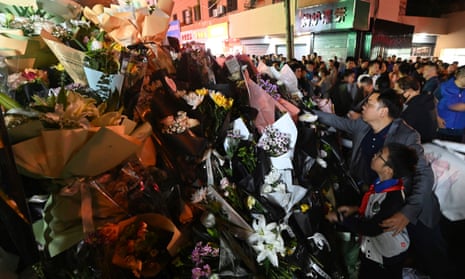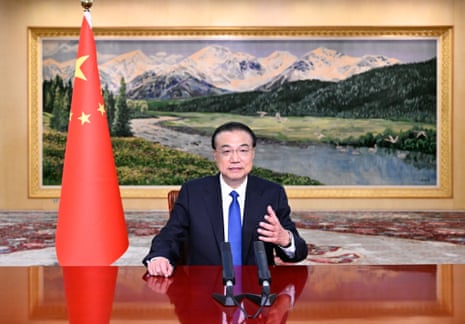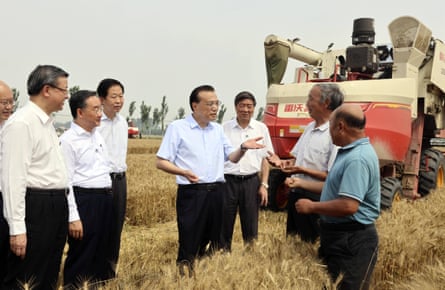Crackdowns on financiers, roiling political climate and slowing economy under Xi Jinping has many seeking exit plans
Amy Hawkins Senior China correspondent @amyhawk_
Mon 30 Oct 2023 23.10 GMT

Billionaires are notoriously difficult to track. It’s no surprise – the easier they and their assets are to find, the easier they are to tax. But by all accounts, the number of uber-wealthy people in China is in decline. Of the world’s estimated 2,640 billionaires, at least 562 are thought to be in China, according to Forbes, down from 607 last year.
With crackdowns on financiers and a roiling political climate, many of China’s rich people are looking to move their money, and themselves, out of the country.
China’s elites have long looked for ways to take their money overseas. Officially, individuals are only allowed to transfer $50,000 (£41,000) out of the country each year. But in practice wealthy people have a range of official and unofficial ways of shifting their funds, whether that is through money exchanges in Hong Kong, where capital controls do not apply, or funnelling cash into overseas businesses.
In August, police in Shanghai arrested five people who worked at an immigration consultancy, including the company’s boss, on suspicion of facilitating illegal foreign exchange transactions in excess of 100m yuan (£11m). In a state media report, the police said “illegal foreign exchange trading seriously disrupts the order of the country’s financial market”.
Before the pandemic, about $150bn flowed out of China each year via tourists taking their funds overseas, according to estimates from the Natixis, a bank. Although international travel has not returned to pre-pandemic levels, high US interest rates and a weak yuan are a strong incentive for cash-rich Chinese to move their money out of the country, economists say.
In the first half of 2023, there was a shortfall of $19.5bn in China’s balance of payments data, which economists use as an indicator of capital flight, although the true value of money unofficially leaving the economy may be higher.
Alicia Garcia Herrero, the chief economist for Asia Pacific at Natixis, says that “a high level of uncertainty about future economic policies and business opportunities in China” also encourages people to take their savings out of the country.
In 2021, Xi Jinping, China’s leader, resurrected a call for “common prosperity”, which was widely interpreted as a call for tycoons to share their wealth more widely. That year Alibaba, the tech company founded by Jack Ma, once one of China’s most high-profile entrepreneurs, donated 100bn yuan to the cause.
Xi is thought to be particularly mistrustful of China’s financial elites since more than $600bn fled the economy in 2015, after a surprise devaluation of the yuan. Since then Beijing has sought to tighten its grip on China’s wealth – and the people who have most of it. The Chinese Communist party (CCP) was particularly spooked when billionaires like Ma started to openly question China’s regulators (after Ma made his comments in 2020, he disappeared from public view for several years).
The “common prosperity” slogan has faded from view as Beijing seeks to promote China as a place that is open for business after three years of zero-Covid. But the pressure on business elites has not relented, and now that borders are open many are looking at exit plans. Last month Hui Ka Yan, the founder of the embattled property developer Evergrande and once Asia’s richest man, was arrested for unspecified crimes. Bao Fan, a renowned investment banker once seen as a kingmaker in the world of technology deals, was detained in February and has not been seen since. Other executives have been placed under exit bans.
The environment now is a marked shift from the 1990s and early 2000s, when China was preparing for entry into the World Trade Organization in 2001 and introducing a host of market reforms that allowed China’s entrepreneurs to amass huge wealth. That was an era in which money-making could come before anything else. But under Xi, who has consolidated his personal power more than any leader since Mao, the emphasis has returned to political control, rather than economic freedom.
“The arbitrary punishment being meted out to the wealthy class is unlike anything we have seen since the 1990s,” says Victor Shih, a professor of China’s political economy at the University of California San Diego. “This has prompted many in that class to think about diversifying out of China.”
There are increasing signs of wealthy Chinese decamping to nearby hotspots. More than 10% of luxury condos sold in Singapore in the first three months of this year went to mainland Chinese buyers, up from about 5% in the first quarter of 2022, according to data from OrangeTee, a real estate company. There are now about 1,100 single-family offices – firms set up to manage the wealth of a specific family – in Singapore, up from 50 in 2018, with around half of that boom estimated to come from Chinese clients.
Wealthy Chinese are also looking for ways to move themselves as well as their money out of China. About 13,500 high-net-worth individuals are expected to leave China this year, up from 10,800 last year, according to Henley & Partners, an immigration consultancy.
“The Chinese government plays for keeps, as Jack Ma and numerous others have discovered,” says David Lesperance, an independent consultant who helps ultra-high-net worth people to relocate. “So we have to look at how to protect your wealth and your wellbeing”.
Lesperance says he receives an increasing number of inquiries from businesspeople who want to move their whole teams out of China, not just their families. As well as the political risks, entrepreneurs no longer feel that China is a land of opportunity, he says. In 2017, China was minting two new billionaires a week. Now, economic growth has slowed.
“Before they would stay because they were making a ton of money in China,” says Lesperance. “Now they’re not making as much money. So they’re like, why am I staying again? Why am I risking this?”
https://www.theguardian.com/world/2023/oct/31/chinas-billionaires-looking-to-move-their-cash-and-themselves-out












